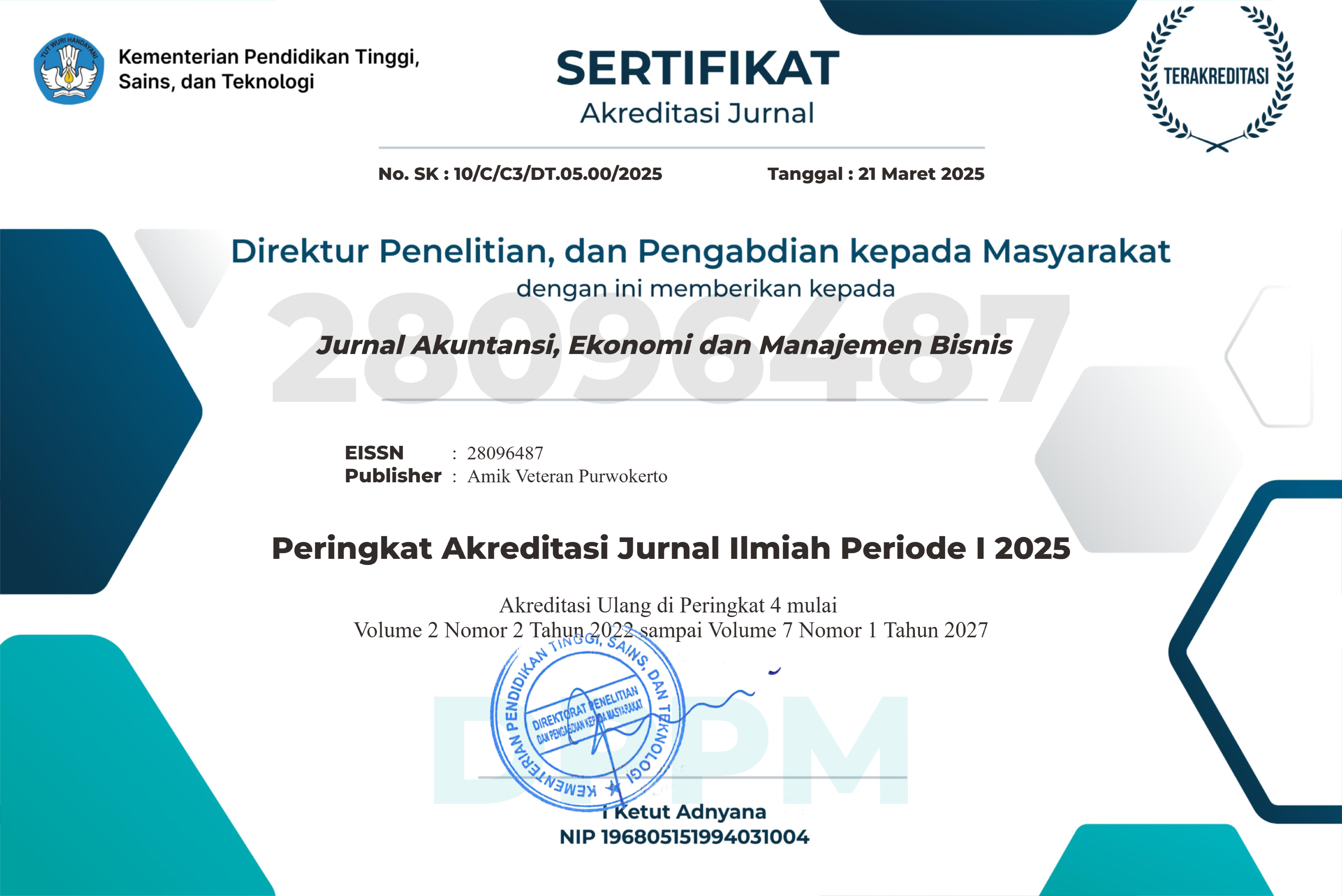Pengaruh Literasi Keuangan Terhadap Perilaku Fear Of Missing Out (FOMO) dalam Pengelolaan Keuangan Pribadi pada Generasi-Z di Kota Bandung
DOI:
https://doi.org/10.55606/jaemb.v5i2.6766Keywords:
Financial Literacy, Fear Of Missing Out (FOMO), Generation-Z, Individual Financial ManagementAbstract
This study aims to analyze the effect of financial literacy on Fear of Missing Out (FOMO) behaviour in personal financial management among Generation-Z in Bandung City. A quantitative research method was employed using a survey approach, with data collection online through questionaires distributed to 108 Generation-Z respondents via the Google Forms platform. The data were analyzed using simple linear regression with the assistance of IBM SPSS 27 software. The results indicate that financial literacy has a positive and significant influence on Fear od Missing Out (FOMO) behaviour, as indicated by a t-value of 10.198, which exceeds the critical value of 1.982, and a significance level of 0.000 (<0.05). These findings suggest that individual’s with higher financial literacy tend to experience stronger of Fear of Missing Out (FOMO) behaviour. Therefore, financial knowledge alone is not sufficient to prevent impulsive financial behaviour. A more comprehensive approach is needed, including the practical applicaton of financial literacy in daily financial decision-making. Additionally, the development of healthy financial attitudes and the strengthening of self-control skills are essential so that individuals can face social pressures and consumerist temptations more wisely, and make financial decisions not merely based on social influence or current trends.
References
[1] S. A. Nur and D. A. Wulandari, “Studi pengelolaan keuangan pada iGeneration,” J. Ilmu Manaj., vol. 13, no. 2, pp. 147–160, 2024, doi: 10.32502/jimn.v13i2.7160.
[2] D. Novitasari, J. Juliana, M. Asbari, and A. Purwanto, “The Effect of Financial Literacy, Parents’ Social Economic and Student Lifestyle on Students Personal Financial Management,” 2021. doi: 10.15294/eeaj.v10i3.50721.
[3] & A. S. Sherwin Ary Busman, Hartini, “Peran Pengetahuaan Keuangan, Gaya Hidup Hedonisme, Kontrol Diri,Dan Literasi Keuangan Dalam Manajemen Keuangan Pribadi Generasi Z Di Kabupaten Sumbawa,” J. EK&BI, vol. 5, pp. 2620–7443, 2022, doi: 10.37600/ekbi.v5i2.680.
[4] P. E. P. Risma Alifia Khoirunnisa, “Literasi Keuangan Memoderasi Hubungan FoMO, Love of Money, dan Self Control terhadap Pengelolaan Keuangan Pribadi,” J. E-Bis Ekon. Bisnis, vol. Vol. 8 No., 2024, [Online]. Available: https://doi.org/10.37339/e-bis.v8i2.1801
[5] A. K. Przybylski, K. Murayama, C. R. Dehaan, and V. Gladwell, “Motivational, emotional, and behavioral correlates of fear of missing out,” Comput. Human Behav., vol. 29, no. 4, pp. 1841–1848, 2013, doi: 10.1016/j.chb.2013.02.014.
[6] J. M. A. Annastika Defi K., “Pengaruh Fear of Missing Out (dan Financial Literacy terhadap Impulse Buying pada Generasi Z,” Neraca Manajemen, Ekon., vol. 12 No. 9, no. 1, 2024, doi: 10.58578/ahkam.v3i1.2619.
[7] H. A. Asyifa, K. Hidayah, and H. C. Haryanto, “PENGARUH FEAR OF MISSING OUT ( FoMO ) TERHADAP PEMBELIAN IMPULSIF ONLINE FOOD DELIVERY PADA GENERASI Z,” pp. 44–56, 2024.
[8] O. J. Keuangan, “Strategi Nasional Literasi Keuangan Indonesia (Revisit 2017),” Otoritas Jasa Keuang., pp. 1–99, 2017.
[9] OECD, PISA 2015 Assessment and Analytical Framework: Science, Reading, Mathematic, Financial Literacy and Collaborative Problem Solving (Revised Edition). 2017.
[10] G. Paramita and N. Musqari, “PERENCANAAN KEUANGAN PRIBADI : MEMAHAMI OBJEK FORMAL DAN MATERIAL DALAM KONTEKS KEHIDUPAN SEHARI-HARI,” vol. 8, no. 4, pp. 895–911, 2024, doi: 10.52362/jisamar.v8i4.1508.
[11] A. N. Yushita, “Pentingnya Literasi Keuangan Bagi Pengelolaan Keuangan Pribadi,” Nominal, Barom. Ris. Akunt. dan Manaj., vol. 6, no. 1, 2017, doi: 10.21831/nominal.v6i1.14330.
[12] W. Younas and M. Farooq, “Impact of Self-Control, Financial Literacy and Financial Behavior on Financial Well-Being,” J. Soc. Sci. Res., vol. 5, no. 51, pp. 211–218, 2019, doi: 10.32861/jssr.51.211.218.
[13] R. F. Baumeister, “Yielding to Temptation: Self-ontrol Failure, Impulsive Purchasing, and Consumer Behavior including the books Evil: Inside Human Violence and Cruelty, Meanings of Life, Losing Control: How and Why People Fail at Self-Regulation, and The Social Dimension of,” J. Consum. Res., vol. 28, no. 4, pp. 670–676, 2002.
[14] M. H. Nur, H. Hadady, and M. N. Bailusy, “Pengaruh Pengetahuan Keuangan Terhadap Perilaku Manajemen Keuangan Dengan Pengendalian Diri Sebagai Variabel Moderasi,” J. Ekon. dan Bisnis, vol. 10, no. 1, pp. 298–305, 2022, [Online]. Available: https://stiemuttaqien.ac.id/ojs/index.php/OJS/article/view/535/350
[15] V. Puspita, D. Rinaldo, and G. Gunardi, “Enhancing Financial Literacy to Promote Sustainability in MSMEs,” J. Ilmu Keuang. dan Perbank., vol. 14, pp. 95–104, Dec. 2024, doi: 10.34010/jika.v14i1.14393.
Downloads
Published
How to Cite
Issue
Section
License
Copyright (c) 2025 Jurnal Akuntansi, Ekonomi dan Manajemen Bisnis

This work is licensed under a Creative Commons Attribution-ShareAlike 4.0 International License.








